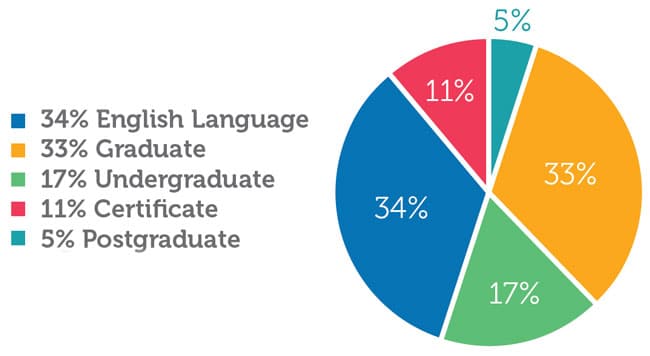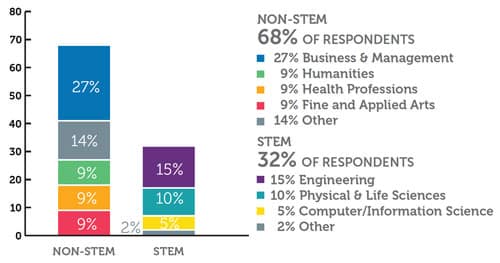Affordability a top concern for South American and Mexican students
Intead has released a special edition report on emerging markets as part of their research series in collaboration with FPP EDU Media (Know Your Neighborhood, which aims to help US educators with recruiting and marketing in specific regions). The report is based on survey responses gathered over June and July this year from more than 12,000 respondents in Latin America and Africa. We will focus our article on South America and Mexico given the more robust sample sizes obtained in these regions.
On a survey-wide basis, however, there are some important global findings regarding perceptions of the US as well as potential barriers to study abroad:
- Two-thirds of prospective students surveyed said that the current political climate in the US does not have an effect on their interest in studying there, versus 26% who said they didn’t like what’s happening in the US. Nine percent said that they were more interested in studying in the US given the current political climate. As the report notes, “the US brand remains strong and students continue to apply and enrol.”
- Two key concerns for prospective students are whether an institution or school has strong student services (such as help in applying for OPT) as well whether they will be able to get a student visa to study in the US.
South America
The South American sample comprised the following countries: Brazil, Colombia, Peru, Ecuador, Chile, Argentina, Venezuela, and Bolivia.
Social media: The most likely places to reach South American prospects on social media are WhatsApp (95% are on it at least once a week), YouTube (83%), Facebook (80%), and Instagram (80%).
Concerns about studying in the US: Just over one-third of students from the region said that obtaining a visa is their biggest worry when considering study in the US. Concern is also high (31%) regarding whether there would be an opportunity for a job in the US. And a majority said that affordability is their first consideration when evaluating travelling to the US for study.
Whether US-based or not, educators are well advised to highlight career placement services, job opportunities, and graduation employment rates in communications with prospective students from the region.
Study orientation: Seven in ten South American students were in non-STEM fields, and the largest proportion of these students were interested in business studies. Of the remaining students in STEM, the largest proportion were pursuing engineering.
Most of the sample was either interested in graduate degrees (38%) or English-language studies (31%), and 19% were considering undergraduate degrees.
The report advises educators to:
“Target STEM prospects for graduate programming and non-STEM prospects for English-language programmes. Target business & management and engineering programmes across all degrees offered.”

Characteristics of select markets
Zeroing in further on leading South American markets, we can observe the following:
Brazil
Brazilians are less worried about getting a visa (19%) than about an unfavourable exchange rate (38% – twice the proportion found in Mexico and three times that in Colombia) and being able to find a job in the US (32%), suggesting that affordability is an area of intense interest for Brazilians. Only 7% said that the political climate in the US would have a negative effect on their interest in studying in the US. Close to half of Brazilians priortise affordability and the same number prioritise student services.

Colombia
Like Mexicans (see below), Colombians are most worried about obtaining a visa (46%) and being able to get a job in the US (33%). They are much less worried about exchange rate issues (12%) and like Brazilians, are not overly bothered about the political environment in the US. Colombians prioritise affordability more than most nationalities surveyed (63%) and look for evidence of strong student services (58%).

Peru
Peruvian students are more like Colombians than Brazilians or Mexicans in terms of their concerns about study in the US. They worry most about being able to obtain a visa (47%) and being able to get a job in the US (30%), and the exchange rate as well as political environment in the US are not major barriers. Proportions saying that affordability and strong student services are most influential in their study abroad decision making are almost identical to those found in Colombia.
Mexico
As in South America, Mexican students are heavy users of WhatsApp (94% are on it at least once a week). Facebook, YouTube, and Instagram are also popular, and STEM graduate respondents were the most likely to favour Twitter and LinkedIn.
Mexicans are more worried than South Americans in general about obtaining a visa (40% – twice the proportion found in Brazil), and less concerned than them about getting a job once they’re there (19%). “Unfavourable political environment” rose as an issue that concerns Mexicans (18% versus 6% for South Americans in general). Affordability is most important influencer of whether Mexican students will study in the US (and where). The report naturally recommends highlighting financial aid that would be available to eligible Mexican students.
The profile of Mexican students is very similar to South American students, with a large majority in non-STEM fields and the most popular areas of study graduate and English-language programmes.

For additional information, please see:
















